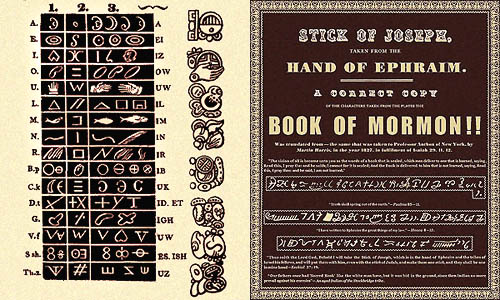Why Was 1st Century Reformed Egyptian Translated into 17th Century King James English in 19th Century America?
 Why Was 1st Century Reformed Egyptian Translated into 17th Century King James English in 19th Century America?
Why Was 1st Century Reformed Egyptian Translated into 17th Century King James English in 19th Century America?
Was it really necessary for the Book of Mormon to be translated into 17th Century King James English? It seems that there is a perception that for something to be scripture, it must be translated into late middle/early modern English, as if that is some kind of God given perfect language. Who knew?
Perhaps people during that time period would be more susceptible to believing that the Book of Mormon is holy writ if it was translated into 17th century King James English. It also attempts to incorporate the Book of Mormon as part of the Bible as advertised as the stick of Joseph as referenced in the Bible, and therefore should have the same language. However, this view demonstrates a naïveness to what the Bible is and where it came from.
Book of Mormon For Our Time
If we are to believe that the Book of Mormon was written for our time, it is more likely that it would have been translated into Modern English so that people that read it could have understood it. Modern English had existed at least 80 years before publication of the Book of Mormon. So why wasn't the Book of Mormon translated into Modern English? Why isn't the Book of Mormon now translated into Modern English? The Book of Mormon has been translated from 17th century English into hundreds of different languages, and it is still considered 'scripture' in those other languages. However, if you translate it from 17th century English into modern English it would no longer become 'scripture', it would just be a personal 'explanation' and could not be used to replace 'scripture'. Why is that? It seems that God is obsessed with 17th century English as if that is the only proper way for him to communicate to English speakers. If that is the case, why aren't other revelations and church declarations that we consider 'doctrine' also written in 17th century English?
17th Century English and the Bible
17th century English has nothing to do with the original writings of the Bible. The Old Testament was translated from Hebrew texts and the books in the New Testament were mostly translated from Greek. King James ordered the translation of the collection of books that we call the Bible into the language of the time so that people could best understand it. So why wasn't the Book of Mormon held to the same standard? Why can't we modernize the language of the Book of Mormon? Why does it have to be in antiquated text?
We Believe the (Church Leadership Approved) Bible To Be The Word of God
We say we believe the Bible to be the word of God as far as it is translated correctly, yet we use the King James version of the Bible, which is not the most correctly translated Bible by any stretch of the imagination. There are tons of translational errors in the King James version. There are many better and more accurate translations written in modern English that are much easier to understand, yet the church is insistent on keeping the King James version as the sole version to use in English. It seems that any other translation is 'heretical'. I guess our article of faith should read "we believe the Bible to be the word of God as far as it is church approved".
Other English Translations of the Bible
The King James version of the Bible was not the first Bible to be translated into English. The Anglo-Saxons had very early translations of some of the books in the Bible in Old English as early as 600 A.D. English translations that occurred in the 14th century were translated into Middle English, as this is what people spoke at the time. There were several translations into Late Middle/Early modern English, including King James, and they were all written in Early Modern English because that is the language that people could best understand at the time. There have been many Biblical translations since King James, and the most modern versions are translated into Modern English because that can be best understood today. Yet for some reason some people are stuck with King James when he is just one of a long procession of English translations.
Disillusioned Mormon
Read more!



